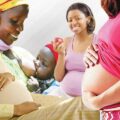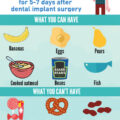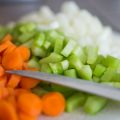Good nutrition during pregnancy, and enough of it, is very important for your baby to grow and develop. To maintain a healthy pregnancy, approximately 300 extra calories are needed each day. These calories should come from a balanced diet of protein, fruits, vegetables, and whole grains. Sweets and fats should be kept to a minimum. A healthy, well-balanced diet can also help to reduce some pregnancy symptoms, such as nausea and constipation.
Eating a nutritious diet during pregnancy is linked to good brain development and a healthy birth weight, and can reduce the risk of many birth defects and other complications. A balanced diet will also reduce the risks of anemia, as well as other unpleasant pregnancy symptoms such as fatigue and morning sickness.
What is subchorionic hemorrhage?
Subchorionic bleeding occurs when the placenta detaches from the original site of implantation. This is called a subchorionic hemorrhage or hematoma. It affects the chorionic membranes. These lift apart and form another sac between the placenta and the uterus. The movement and resulting clots are what cause this type of bleeding. These hematomas can range in size, with the smallest being most common. Larger versions can cause heavier bleeding.
Subchorionic hematomas are just one cause of bleeding in pregnancy. Their precise cause is unknown. They’re also not the same as spotting. Spotting occurs in about 15 to 25 percent of women during the first trimester, according to the American College of Obstetricians and Gynecologists. While spotting can occur at any stage of pregnancy, it’s most common in the first trimester.
Bleeding that goes beyond a few spots and requires a pantyliner is often a sign of something else. Subchorionic bleeding is one such possibility. Bleeding tends to be the only sign or symptom of subchorionic hematoma. You may not even realize you have one until your doctor performs an ultrasound. Subchorionic hematomas appear to be a result of the partial separation of the chorionic membranes from the uterine wall. The presence of a uterine malformation, a history of recurrent pregnancy loss, or pelvic infections is all possible predisposing factors to a subchorionic hemorrhage.
Are there foods to heal subchorionic hemorrhage?
No, subchorionic hemorrhage typically goes away on its own. There is no specific food or treatment required. Eat foods that are high in iron and vitamin C. Foods high in iron include red meat, shellfish, eggs, beans, and leafy green vegetables. Foods high in vitamin C include citrus fruits, tomatoes, and broccoli. Ask your doctor if you need to take iron pills or a multivitamin.
Your doctor is likely to recommend that you reduce your activity levels. They might also suggest that you limit any travel. Your doctor will likely recommend hospitalization if any bleeding, cramping, or contractions occur.
Rest and relax, do not undertake heavy lifting or strenuous exercise, and abstain from sex, tampon use, or douching. Drink plenty of water and try to avoid dehydration. It is important to keep in contact with a healthcare provider so they can follow your condition.
To reduce the chance of harming yourself or your baby, you should avoid certain foods.
Some dairy
You should avoid eating
- unpasteurized semi-hard and soft cheeses (unless cooked until steaming hot)
- all mold-ripened soft cheeses with a white coating on the outside, such as brie, camembert and chèvre (unless cooked until steaming hot)
- soft blue cheeses such as Danish Blue, Gorgonzola, and Roquefort (unless cooked until steaming hot)
- any unpasteurized cow’s, goat’s, or sheep’s milk or cream
Liver and pâté
Liver and liver products such as pâté or liver sausage can have large amounts of vitamin A. This can be harmful for your baby. All types of pâté, including vegetable versions, can have listeria in them. It’s best to avoid them.
Some fish
Do not eat swordfish, marlin, shark or raw shellfish.
Do not eat smoked fish products, including smoked salmon and smoked trout, unless thoroughly cooked as they can present a risk of Listeria. This includes in sushi.
Some meats
You should not eat game meat, such as hare, partridge or pheasant due to the presence of lead. You should also not eat raw or rare meat as this can cause food poisoning.
Always make sure any meat you eat is well cooked and steaming hot all the way through. You should not be able to see any pink meat and the juices should run clear.
Too much oily fish or tuna
Try not to have more than two portions of oily fish a week. Oily fish includes mackerel, sardines and trout.
Tuna is not classed as an oily fish, but do not eat more than two tuna steaks (about 140g cooked or 170g when raw) or four medium-size cans of tuna (about 140g when drained) per week.
Sprouted seeds
These need to be cooked well until they are hot throughout to make sure they do not make you ill.
Unwashed fruit and vegetables
Be careful with fruits, vegetables and salads as they can have soil on them, which can make you unwell. Make sure to thoroughly wash all fruits, vegetables and salad ingredients.
Safe foods
During pregnancy it’s safe to eat:
- cooked fish
- sushi, but only if the fish has been cooked thoroughly
- seafood/shellfish as long as it has been cooked, for example mussels, lobster, crab, oysters, scallops, clams and cold, pre-cooked prawns
- Peanuts and other nuts (unless you’re allergic) – eating nuts when pregnant will not affect whether or not your baby has a peanut allergy
- spicy food – there’s no reason to avoid spicy foods
- honey – it’s ok for you to eat honey, but you should not give it to your baby until they’re over a year old
Dairy foods
You’re safe to eat some milk and dairy foods, including:
- All hard cheeses, such as cheddar, Parmesan or Gruyere
- Pasteurised semi-hard and soft cheeses, such as cottage cheese, mozzarella, feta, paneer, ricotta, halloumi, cream cheese, cheese spreads, or goat’s cheese without a white coating on the outside (rind)
- Any cheese that has been thoroughly cooked until steaming hot
- Pasteurised milk and yoghurt
Cream and ice cream are safe, but are not considered ‘dairy’ by The Eatwell Guide and have high sugar and fat content.
Eggs
You can eat runny or even raw eggs as long as they are pasteurized, or have the British Lion Code mark on them, or are Laid in Britain (LIB) eggs.
Foods made with these eggs are also safe to eat. This includes:
- mayonnaise
- ice cream
- salad dressing
- mousse
Make sure that duck, goose and quail eggs are thoroughly cooked.
If you’re eating out and not sure if they use British Lion Code or Laid in Britain eggs, ask the staff to find out for you.
Healthy drinks
Aim to have 6 to 8 200ml glasses of water or other fluids every day, and:
- try different kinds of drinks, such as sugar-free squash, decaf tea and coffee, fizzy water, fruit juice or smoothies
- limit fruit juice or smoothies to 150 ml per day with meals to help to prevent damage to your teeth
Decaffeinated coffee and tea are safe to drink during pregnancy.
Do not drink alcohol during pregnancy.
Water
Drink plenty of water when you’re pregnant to keep hydrated and stop you getting constipated, especially in your last 3 months.
You should boil water before you drink it if you get your drinking water from a private supply, such as a well, borehole or spring. The quality of water from private supplies can vary a lot and when it’s poor it can cause health problems.
Herbal drinks
During pregnancy you should:
- have no more than 4 cups of herbal or green tea a day as there isn’t enough evidence about their effect on developing babies
- avoid teas that contain ginseng or echinacea as doctors aren’t sure what effects they might have when you’re pregnant or breastfeeding
Talk to your midwife if you’re unsure about using any herbal products.






